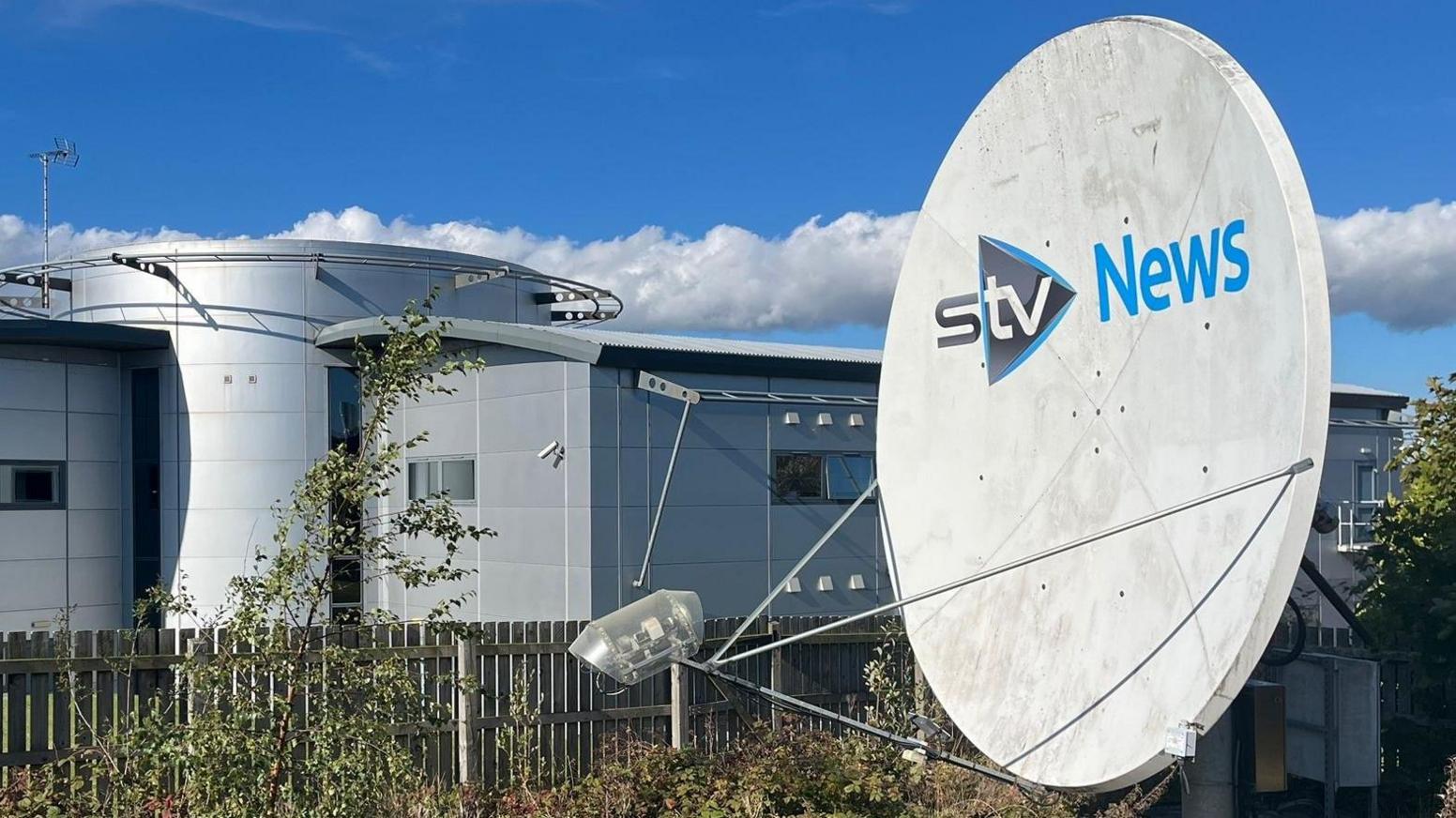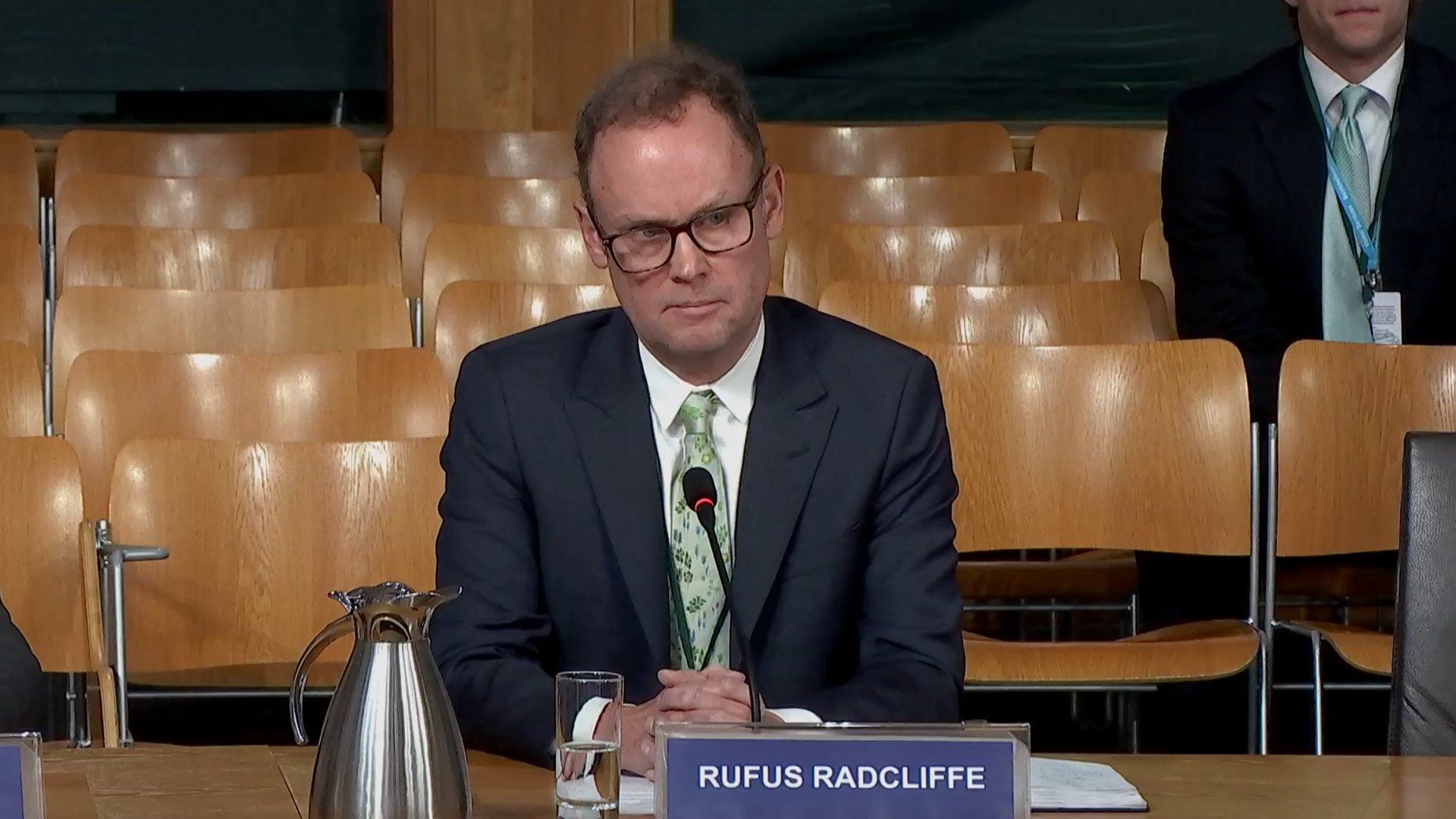STV says no permission needed to move north news production

The broadcaster plans to axe its news programme from Aberdeen
- Published
STV bosses say they do not need permission from the media regulator to move production and presentation of their north of Scotland news programme to Glasgow.
The broadcaster intends to cut 60 jobs and axe its Aberdeen-produced show as part of money-saving measures.
Speaking to the Scottish Affairs Committee at Westminster, STV chief executive Rufus Radcliffe confirmed that a voluntary redundancy programme had closed.
The National Union of Journalists said the changes would be "absolutely devastating" for northern Scotland.
Mr Radcliffe said the jobs cuts would be "very difficult" for staff but that changes were required due to challenging market conditions and a drop in viewership.
'Arrogance beyond belief'
Last year, STV negotiated a 10-year deal for television licences in both northern and central Scotland. The agreement came into force in January.
The broadcaster is now seeking to amend that deal to allow it to produce a single news programme for both regions.
Media watchdog Ofcom would have to give the green light to any changes to the licence agreement.
However, STV says it does not need permission to move production and presentation for its Aberdeen news programme to Glasgow.
It comes after the company spent a reported £500,000 on upgrading its Aberdeen studio, which unions saying it will be "mothballed" if the northern news show is axed.

STV chief executive Rufus Radcliffe has defended the cost-cutting plans
Nick McGowan-Lowe, national organiser for Scotland at the National Union of Journalists, told MPs that the process of moving production and presentation to Glasgow put up to 10 jobs at risk.
He also said it could lead to news coverage for Aberdeen being pre-recorded in the afternoon before being broadcast later in the evening - a claim that STV disputed.
Mr McGowan-Lowe said he was "appalled" to learn that at-risk staff had been spoken to by STV without "meaningful" consultation with unions.
He added that pushing ahead with the plan without union consultation or Ofcom approval would be "arrogance beyond belief".
STV is hoping to cut 60 jobs across the business, about half of which are expected to be in news.
Mr McGowan-Lowe said the voluntary redundancy programme would lead to less than half of the job cuts targeted by STV.
STV accused of financial mismanagement over plan to cut news show
- Published9 October
Culture secretary 'deeply concerned' over STV cuts
- Published27 September
STV has been criticised for spending £500,000 this year on setting up a new radio station, which is due to go live next year. It is not expected to turn a profit until 2027.
Philippa Childs, head of the Bectu union, told MPs that STV had "no expertise" in radio and that launching a new station was a "mistake".
STV is seeking about £3m of savings by next year after announcing a £200,000 pre-tax loss in the first six months of 2025, though the company is expected to be profitable over the year as a whole.
What area does STV's northern news show cover?
SNP MP Dave Doogan said that STV's northern news show covered more than half of Scotland's land mass and a quarter of its population.
He told Mr Radcliffe: "And I can assure you we are not much interested in getting the news as it happened two hours ago."
The STV chief executive told the committee: "The cost-saving plan is very difficult for colleagues and we are determined to give people clarity as soon as we can.
"But we believe it is the right response to the market conditions that we are in now and also the long-term trends in terms of viewing behaviour."
He denied that the cuts were a "knee-jerk" reaction to the company's share price dropping by a third following a profit warning in July.
Divisional managing director Bobby Hain said the company did not need permission from Ofcom to move studio production and presentation to Glasgow, citing examples elsewhere in the Channel 3 network where regional news programmes are pre-recorded in advance.
He said the company would be meeting unions on Monday to discuss how the cuts might impact on roles.
Mr Hain denied that STV had had ignored requests for collective consultation and said it was working with unions.
"We are focused on what we think is the best outcome, retaining reporting and specialist knowledge in the north for online distribution and for inclusion in a new programme," he told MPs.
He said that the Aberdeen studio would continue to be used by STV journalists for live broadcasts as a back-up studio.

The TV regulator Ofcom will need to approve STV's proposal for a single, live news programme covering both central and northern Scotland.
It could block the scheme completely or help broker a compromise.
But simply moving studio production and presentation to Glasgow does not in itself require Ofcom's approval.
There are a number of examples elsewhere on the Channel 3 network of regional news programmes presented from centralised hubs some distance away.
For instance, the news programme for the ITV Border region – which covers southern Scotland and Cumbria – is presented from the Gateshead studios of ITV Tyne Tees.
This leads to the question of what might happen if Ofcom rejects or modifies STV's plan for a single programme.
If a separate north service were retained – or the new programme were to include bespoke sections seen only by viewers in central and northern Scotland – it would seem inevitable that some of the programme would have to be pre-recorded unless STV decided to ditch its proposals for the Aberdeen studio completely.
Ofcom is expected to begin its consultation before the end of the year.
The regulator will be mindful of the views of the public and politicians but it will also consider the financial realities facing STV. In isolation, the news service loses money and is effectively subsidised by other parts of the schedule.
Historically, Channel 3 broadcasters carried a wide range of public service obligations in return for privileged access to the airwaves. Once, they were commercial monopolies.
However, a Channel 3 licence no longer offers a broadcaster many automatic advantages over its competitors so it is far harder to impose any loss-making legal obligations.